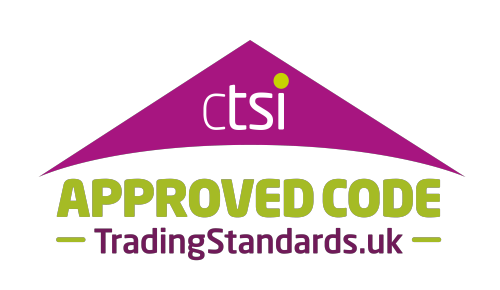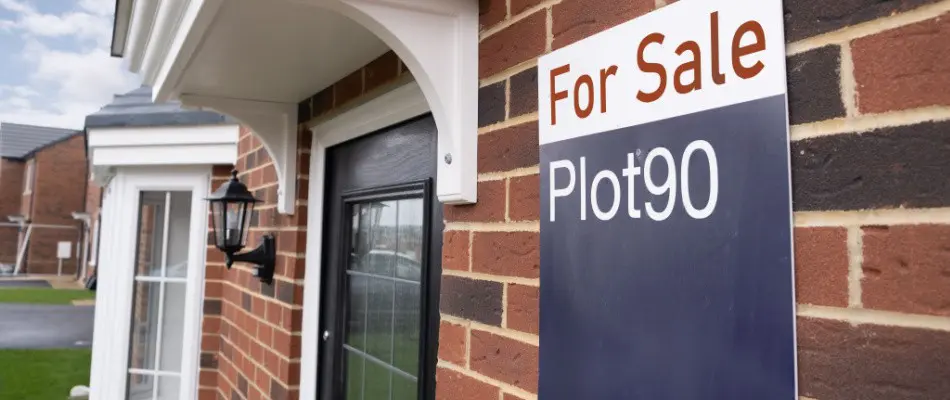11 questions to ask before buying a new build home
4.9 Star rating

reviews

Buying a new build home can be an exciting experience, but it’s not something you should rush into. There are many factors to consider before making such a big purchase and entering the buying process, so you can ensure it’s a worthwhile investment and you aren’t left with the fallout from a bad property deal.
This is true of all property types, but especially for new build properties. Data suggests that 53% of homebuyers would prefer to purchase new build properties instead of an existing property.
However, first-time buyers purchasing new build homes instead of older properties should know that not every new build is a high-quality home.
We’ve all seen horror stories in the news about dodgy developers who exchange contracts on unfinished buildings that never seem to get fixed, which is why it’s so important to ask the right questions at the start of the buying process. There are no former owners to ask about the property – just a sales team – so you need to get as much information as possible from the developer before committing to a sale contract with them.
If you’re a first-time buyer or have never bought a new build before, you might not know which questions you should be asking to avoid being caught out by unscrupulous sellers.
A property’s purchase price can often be easy enough to reel in some first-time buyers, but we’re here to guide you when buying a new build home.
To help you out, here is a list of 11 of the most important questions buyers should ask when buying a new build home to get a better picture of what they’re paying for.
1) What else has the developer worked on?
Speaking directly to representatives from the development company can give you insight into their work, but you should do plenty of your own research. You wouldn’t trust a builder who had never built a house before, so you need to be sure they can deliver what they’re promising.
Some online searching can reveal the kind of reputation the company has, and their track record for completing high-quality developments on time for your move-in date. If you aren’t too far away from an existing finished development they were responsible for, why not go and take a look in person?
This will give you a better idea of the final look and what you can expect the occupied community to be like. Even better, if you see any homeowners around when looking at the completed buildings, you could ask them about their experiences with the developer and living in a home they built.
You may also be able to find reviews online regarding the developer’s customer care procedures. If their sales and/or after-sales support is abysmal, then it’s a company you should avoid.
2) What’s included with the new build home?
If you’re buying an off-plan home, there won’t be much to see at the start, so you won’t know exactly what you’re getting until the building is finished. You don’t want to commit to buying a house based on a photo in a brochure or a model home.
Developers can pull out all the stops for a ‘show home’ to impress potential buyers, but this doesn’t necessarily mean that your house will get the same finishes as standard. To make an informed decision, you’ll need a list of everything that comes with your new build.
This will help to avoid the unpleasant surprise of discrepancies down the line, such as missing items or varying designs. Knowing exactly what you’re getting will also help with budgeting for what else you’ll need to pay for, rather than facing unexpected costs right before moving in.
Some examples of questions you should ask about new build inclusions are:
- What are the standard finishes? – From electrical sockets to door handles, living room furniture to kitchen countertops and white goods, what fixtures and furnishings can you expect?
- Will there be enough storage? – How many walk-in closets, utility rooms, and cupboards will your family need as a minimum?
- Is landscaping included? – Is there a front garden or back garden, or both? Will there be any grass, trees, flowers, hedges, or other plants installed?
- Will there be a parking space? – If there is a driveway, how big will it be, and will it be shared with a neighbouring property? If not, is there separate allocated parking?
A reputable company should be happy to provide copies of all drawings, plans, and specifications for the build, so you can check for yourself that everything lines up.
Depending on the developer and how early you enquire, it might be possible for you to customise some of the fittings. If you don’t ask, you won’t get, so it’s worth checking whether you can choose some of the finishes for yourself, ensuring you don’t end up with the same designs as every other property in the area.
3) How energy efficient is the new build?
Increased environmental awareness and the importance of reducing carbon footprints mean that most buyers are looking for a ‘green’ home that’s as energy efficient as possible. Not only is this better for the future of the planet, but also for your bank account, as reducing wasted energy means cutting your electricity bills, too.
All private properties must have an Energy Performance Certificate (EPC) with a minimum rating of E before the property can be let or sold. Buildings can be given a rating ranging from G for the most inefficient to A for the most efficient.
The Energy Performance Certificate will outline the estimated energy costs for the building and also have suggestions for how to improve its energy efficiency. You should be looking for new build properties with an A rating, or a B with improvement potential at the very least. A home with a lower EPC rating will be available at a lower property price, but remember that your bills will cost more.
Most new build homes utilise modern technology to achieve a higher rating, but some are more energy efficient than others. Be sure to check the following details with the seller:
- Which energy-efficient measures/materials have been used? (e.g. double glazing, loft insulation, low energy lighting, water conservation systems).
- How do the central heating and air conditioning systems work?
- Is the property wired for an electric car domestic charging point?
- Which electricity, gas, and water companies supply the property?
- What are the estimates for the property’s monthly running costs?
The more energy efficient the build, the lower the costs, and the more your home will be worth over time. If possible, it’s a good idea to get their representative to show you what the home’s systems look and sound like while running, so you can be sure that they aren’t noisy or disruptive.
4) Does it come with a new home warranty?
Just because the house is brand new doesn’t mean there won’t be problems. Fortunately, most come with a new home warranty. This is a type of structural warranty taken out by the developer at the start, which gets passed on to the buyer and new homeowner.
As the latest building regulations are continuously tweaked to improve health and safety, it has become routine for builders and developers to include a structural home warranty with every new property completed.
There will be an opportunity for you to make a snag list of minor defects for the builders to fix before you move in, and you can usually contact the developer within the first few months of living there to address any other small problems that arise with the new build home.
After this, you’ll have to rely on the building warranty if a defect develops. These warranties typically last for 10 years, including an initial 2-year period of defects insurance followed by a remaining 8 years of structural defects cover. However, this will be changing under the Building Safety Act, which now requires these policies to offer a minimum of 15 years of cover.
In any case, guarantees can vary between providers, so it’s best to ask the developer what their chosen policy does and doesn’t cover. You’ll need to know what you’re paying for, how much, and for how long, as you’ll be responsible for the warranty when you purchase the home.
It’s also a good idea to ask your estate agent/salesperson for copies of any other warranties that might come with the new build, such as guarantees for any white goods or furniture that may be included with the purchase.
5) How much does a new build home cost?
If you’re buying from a large community development, there will likely be just a few different models to choose from. You should be able to avoid bidding wars and make a buying decision based on a transparent purchase price, knowing everything that is included.
From reservation fees to land lot costs, there are many different fees involved in buying a home, so make sure the seller lays out all the costs. You don’t want to be surprised by hidden charges later on, such as furnishings or landscaping, that weren’t included in the initial price.
It can be helpful to check that the contract has a cost escalation clause, which prevents you from being financially responsible if the cost of building materials or labour rises during construction. Instead, you’ll pay the original price, without footing the bill for inflation or delays.
Some developers are also open to negotiation, and may accept reasonable offers below the original asking price, or add features like furniture and white goods either at a reduced cost or for free. It’s worth asking the developer if they’re open to offers or if any discounts are available.
This is down to the developer’s discretion, and often depends on factors such as the level of buyer interest, how long the homes have been on the market, and how many are left to sell.
Another property-related cost that you should consider before committing to a new build is the Council Tax cost for the area and the particular Council Tax band for the property. You may not be able to check this online if there is no registered address yet, so you should ask the developer.
6) Is it a freehold or leasehold property?
Depending on the type of property you’re buying, you’ll need to check whether it’s a freehold or leasehold. Freeholders own both the home and the land it sits on, whereas leaseholders only have ownership of the home for a limited period while the freeholder still owns the land.
New build flats or apartments are likely to be leasehold properties, meaning you’ll usually be able to use the property for 90 to 999 years. The lease will also come with rules from the freeholder, which can limit property alterations or regulate pet ownership.
The problem with leasehold properties is that you have to pay ground rent and cover maintenance costs, as builders can charge rising fees. You would have to factor these additional costs into your budget, which can be difficult if they keep increasing every few years.
Due to the controversy around these practices, the government introduced a ban on new build houses being sold as leasehold properties in 2019. This means any brand new house you buy should be freehold, but it’s still worth double-checking before you commit to anything.
Unfortunately, the ban doesn’t apply to new build apartments, so it’s essential to specify the terms, and you’ll need to get a solicitor involved for a leasehold.
7) Are there any support schemes available?
Buying a home is one of the biggest expenses for most people in their lifetimes, so looking for financial help is vital to ensure you get the best possible deal for your purchase. There can be fewer options when buying off-plan or financing the construction of a brand-new home, but you’ll still need to shop around to find the best mortgage with the most competitive rates.
If you ask your developer, they can likely point you in the right direction when it comes to independent mortgage advisors and potential support schemes. An impartial mortgage advisor can do the research for you and present the most appropriate options for your needs.
Some developers offer incentives for buyers to use a preferred mortgage lender, such as upgrades to the home’s finishes, so you should also enquire about this. You’re not obligated to go with the builder’s lender, though, so you should still research to compare different deals first.
The developer may also offer a ‘part exchange’ scheme if you’re selling your old home, which can take away the stress of putting it on the open market. They can buy your existing home from you in exchange for part of the cost of the new build you want to buy from them.
While the UK government’s Help to Buy equity loan scheme has now closed, there are still several home ownership government schemes to help buyers gain part or full ownership of a home. These aren’t all limited to first-time buyers, so you should be able to get financial support whether you’re stepping onto the property ladder or moving up to a bigger family home.
8) Who else is buying properties in the development?
Knowing the level of interest in the development and who exactly is expressing that interest can help you to make an informed decision about whether or not you want to live there. Be sure to ask the developer how many units have already been sold, and to which types of buyers.
Just as you would if you were buying a secondhand property, you’ll want to know who your neighbours will be and what kind of community you can expect in the development. Is it likely to be families with young children, or young professionals getting on the property ladder?
In some cases, property investors can snap up several homes in a new development to rent them out. This isn’t always ideal, as it often means there’ll be a higher turnover in tenants, and you won’t know which type of neighbour you’re going to get.
If there is a lot of interest in the development and a high take-up among buyers, this can also put pressure on your final buying decision. It’s important to know roughly how long you’ll have to decide whether to reserve a property or not – but remember that the earlier the reservation, the greater your chances of securing the exact unit you prefer.
9) What will the neighbourhood be like?
While you may be satisfied with the site plan right now, the developer may have plans to extend the development in further phases. This means that green space and lovely views could soon be replaced by more houses, bringing more people into the neighbourhood.
Not only could this affect the views from your home, your privacy, and the light your living space receives, but it also means there’ll be increased traffic in the area. Packed parking and congestion could quickly lower your living standards, becoming stressful to navigate and also lowering the value of your home if you decide to sell up and move on.
Be sure to question the developer about the finality of the development site plans and check whether they intend to build more houses at a later date.
Similarly, you should inquire about the roads, footpaths, and public spaces in the community – who will be responsible for their upkeep, and will they be extended in the future?
10) Are there any renovation restrictions?
Many large developments come with ‘restrictive covenants’ enforced by the builder. These are regulations that control what you can and can’t do to your property, to keep appearances uniform throughout the development.
These rules could cover anything from not allowing pets or outdoor clotheslines to prohibiting satellite dishes or CCTV cameras. You’ll have to ask permission if you want to add things or make modifications like this, and you may be refused.
If you want to add an extension later on or customise your new build home with refurbishments that alter its exterior, then a development with such covenants isn’t the one for you.
Since restrictive covenants stay with the home and the development, they can also hurt your ability to sell the property. Like you, potential buyers may be put off by the inability to make changes to their own home.
Additionally, community-based developments may have some type of homeowners association, which will have further guidelines on what you can and can’t do.
While they can help maintain amenities and keep public behaviour pleasant, these associations usually require a membership fee, and you may not want to pay to be told that you can’t have your front door a certain colour.
11) When will it be ready for moving in?
When buying a home that hasn’t been built yet, you’ll want to know the construction schedule in as much detail as possible. The builders will aim to complete the development on an efficient timeline, but there are factors beyond their control that could end up causing delays at any stage.
Most importantly, you should ask if there will be a long stop completion date in the sale contract. This means that if the property isn’t ready by the specified completion date, you will be entitled to compensation and the right to terminate the contract if you choose.
This is because delays aren’t just frustrating for making moving-in plans, but can also affect your financial options. Mortgage offers are typically only valid for up to 6 months, so construction delays can lead to offers expiring and holding up the purchasing process.
You should ask what the developer’s contingency plans are if the project falls behind schedule. The sale contract should specify what counts as an ‘excusable’ delay and how your payments will be affected if delays of any kind do happen.
When it comes to making plans for moving into the new build, the developer should initially be able to give you an estimated date within a one to two-month window. This can be revised to a more exact date as work progresses, so you should know when it’s safe to start packing.
Don’t forget to ask about access roads, as well. Laying and surfacing roads may not be completed until the very last unit in the development has been built, so if your home is already finished and you intend to move in earlier than this, you might have to deal with roadworks for a while.
Protect your property purchase with a building warranty
Making a list with all of these questions and keeping notes of the developer’s answers should help you when choosing a property to buy and a company to buy from. Knowing what to ask can be invaluable in saving you from unpleasant surprises later when you’re already locked into a contract.
A good and reliable developer should be happy to answer any questions you may have, making sure you have the correct up-to-date information about the development, your chosen property, and how they run their business.
You could also confirm that the property has an up-to-date warranty from a company like the National House Building Council. But we believe you’ll find a better service and value at ABC+ Warranty.
We know how important it is for any new construction to have a structural warranty. If you ask your developer about this and they haven’t set one up yet, then you should aim to arrange this yourself as early as possible in the building process.
For more information about new build warranties, or to get a quote, please get in touch with our team by calling us on 0161 928 8804 or emailing us at info@architectscertificate.co.uk.
Speak To ABC+
Enter your details below and one of our experts will be in touch
4.9 Star rating

reviews










